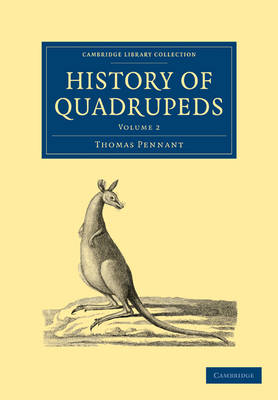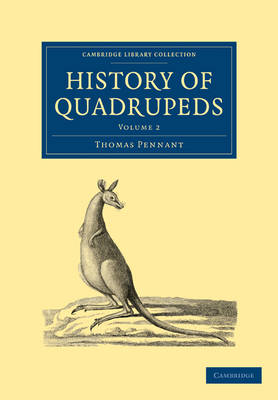
- Afhalen na 1 uur in een winkel met voorraad
- Gratis thuislevering in België vanaf € 30
- Ruim aanbod met 7 miljoen producten
- Afhalen na 1 uur in een winkel met voorraad
- Gratis thuislevering in België vanaf € 30
- Ruim aanbod met 7 miljoen producten
Zoeken
Omschrijving
Thomas Pennant (1726-98) was a keen geologist, naturalist and antiquary. Linnaeus supported his election to the Royal Swedish Society of Sciences in 1757, and in 1767 he became a Fellow of the Royal Society. His History of Quadrupeds (1793), aimed to promote natural history among a wider readership, originated in an informal index to John Ray's Synopsis of 1693. In his preface, Pennant acknowledges the monumental Histoire naturelle by the Comte de Buffon, as well as works by Klein (1751), Brisson (1756), and particularly the work of Linnaeus, though Pennant strongly disagreed with Linnaueus's classification of primates as including humans with apes. Pennant's two-volume book, beautifully illustrated with over 100 engravings, provides an overview of the state of zoological classification at the end of the eighteenth century. Charles Darwin owned a copy and had it sent to him in South America during the Beagle voyage.
Specificaties
Betrokkenen
- Auteur(s):
- Uitgeverij:
Inhoud
- Aantal bladzijden:
- 448
- Taal:
- Engels
- Reeks:
Eigenschappen
- Productcode (EAN):
- 9781108005173
- Verschijningsdatum:
- 20/07/2009
- Uitvoering:
- Paperback
- Formaat:
- Trade paperback (VS)
- Afmetingen:
- 170 mm x 244 mm
- Gewicht:
- 707 g

Alleen bij Standaard Boekhandel
+ 86 punten op je klantenkaart van Standaard Boekhandel
Beoordelingen
We publiceren alleen reviews die voldoen aan de voorwaarden voor reviews. Bekijk onze voorwaarden voor reviews.








